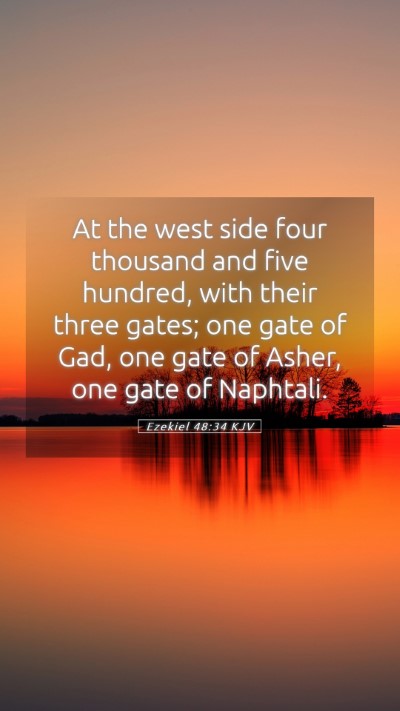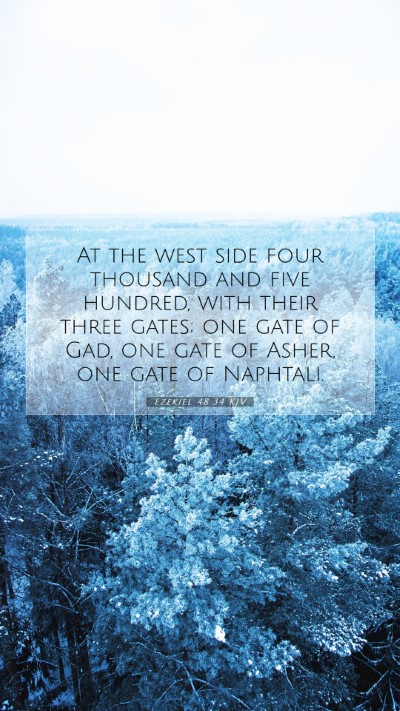The verse Ezekiel 48:34 states, "At the circumference of the city shall be eighteen thousand measures: and the name of the city from that day shall be, The Lord is there." This verse encapsulates profound theological and symbolic significance, particularly within the context of Ezekiel's vision of the restored Israel.
Bible Verse Meanings
The measurement of the city signifies perfection and completeness in God's divine order. As emphasized in various Bible study insights, the specified "eighteen thousand measures" conveys not merely a physical dimension but hints at the sacredness and permanence of God’s dwelling place among His people.
Bible Verse Interpretations
Matthew Henry notes that this verse points to the security and presence of God. The city symbolizes a renewed community intended for God’s people, thriving under His lordship. In this context, "The Lord is there" indicates not only His physical presence but also His active involvement in the lives of His followers.
Adam Clarke elaborates on the implications of the name given to the city. He asserts that this name embodies the promise of God's perpetual presence. It signifies a restoration from the exile and a future where worship and fellowship with God are fully realized.
Bible Verse Understanding
The significance of Ezekiel 48:34 is particularly profound when viewed through the lens of historical context. Following the Babylonian exile, the people of Israel yearned for a renewed identity and stability. This verse reassures them of God's commitment to dwell among them once more, serving as a beacon of hope and restoration.
Bible Verse Explanations
-
God's dwelling among His people: The declaration that "The Lord is there" highlights the intimate relationship between God and his people, reminiscent of His presence in the Tabernacle and Temple.
-
Symbolism of the city: Ezekiel’s vision presents a new Jerusalem, representing both a literal city and a metaphor for the spiritual state of Israel.
-
Assurance of divine protection: The precise measurements suggest that the new city is divinely ordained, providing assurance that God’s people will live under His protection.
Bible Verse Commentary
The commentary by Albert Barnes highlights how the measurements and the name signify the breadth of God's mercy and the reality of His permanent presence. This reinforces the theme of restoration woven throughout the prophetic literature and offers comfort to those who faced displacement and despair.
Application of the Verse
Understanding Ezekiel 48:34 can profoundly influence how believers approach their own sense of community and worship. In modern study groups, this verse may serve as a pivotal discussion point about God's ongoing presence in the life of the Church. How does knowing that "The Lord is there" affect your faith and fellowship with other believers?
In-Depth Bible Verse Analysis
The "measurements" can also be interpreted spiritually. The flawless design hints at God’s ultimate authority, a theme echoed across various Bible study materials. It invites believers to reflect on their relationship with God and the spaces they create for Him in their lives.
Bible Cross References
- Isaiah 7:14: The promise of Immanuel, "God with us," reflects the fundamental hope of divine presence.
- Revelation 21:3: The ultimate fulfillment of God dwelling with humanity in the New Heaven and New Earth reinforces the implications of Ezekiel’s vision.
- Psalm 46:4: "There is a river whose streams shall make glad the city of God," emphasizes the joy inherent in God's presence.
Conclusion
In summary, Ezekiel 48:34 serves as a powerful reminder of God's promise to reside with His people. As Bible study lessons unfold this verse, believers are encouraged to explore its implications for community, worship, and daily living. Through this scriptural lens, one can appreciate the enduring nature of God's covenant and His unwavering commitment to His chosen people.


